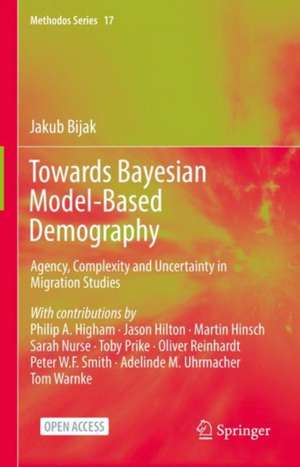Towards Bayesian Model-Based Demography: Agency, Complexity and Uncertainty in Migration Studies: Methodos Series, cartea 17
Autor Jakub Bijak Contribuţii de Philip A. Higham, Jason Hilton, Martin Hinsch, Sarah Nurse, Toby Prike, Oliver Reinhardt, Peter W.F. Smith, Adelinde M. Uhrmacher, Tom Warnkeen Limba Engleză Paperback – 10 dec 2021
| Toate formatele și edițiile | Preț | Express |
|---|---|---|
| Paperback (1) | 281.46 lei 3-5 săpt. | +23.40 lei 4-10 zile |
| Springer International Publishing – 10 dec 2021 | 281.46 lei 3-5 săpt. | +23.40 lei 4-10 zile |
| Hardback (1) | 428.46 lei 6-8 săpt. | |
| Springer International Publishing – 10 dec 2021 | 428.46 lei 6-8 săpt. |
Din seria Methodos Series
- 18%
 Preț: 950.52 lei
Preț: 950.52 lei - 18%
 Preț: 946.72 lei
Preț: 946.72 lei - 15%
 Preț: 643.65 lei
Preț: 643.65 lei - 18%
 Preț: 1118.13 lei
Preț: 1118.13 lei -
 Preț: 426.56 lei
Preț: 426.56 lei - 20%
 Preț: 563.66 lei
Preț: 563.66 lei - 18%
 Preț: 1006.72 lei
Preț: 1006.72 lei -
 Preț: 354.54 lei
Preț: 354.54 lei -
 Preț: 350.72 lei
Preț: 350.72 lei - 18%
 Preț: 780.37 lei
Preț: 780.37 lei - 15%
 Preț: 646.62 lei
Preț: 646.62 lei - 15%
 Preț: 646.94 lei
Preț: 646.94 lei - 15%
 Preț: 645.79 lei
Preț: 645.79 lei - 18%
 Preț: 894.03 lei
Preț: 894.03 lei - 15%
 Preț: 638.11 lei
Preț: 638.11 lei - 18%
 Preț: 1668.36 lei
Preț: 1668.36 lei - 15%
 Preț: 638.24 lei
Preț: 638.24 lei - 24%
 Preț: 786.71 lei
Preț: 786.71 lei -
 Preț: 98.73 lei
Preț: 98.73 lei
Preț: 281.46 lei
Nou
Puncte Express: 422
Preț estimativ în valută:
53.86€ • 56.37$ • 44.83£
53.86€ • 56.37$ • 44.83£
Carte disponibilă
Livrare economică 11-25 martie
Livrare express 22-28 februarie pentru 33.39 lei
Preluare comenzi: 021 569.72.76
Specificații
ISBN-13: 9783030830410
ISBN-10: 3030830411
Pagini: 390
Ilustrații: XXV, 263 p. 46 illus. in color.
Dimensiuni: 155 x 235 x 23 mm
Greutate: 0.41 kg
Ediția:1st ed. 2022
Editura: Springer International Publishing
Colecția Springer
Seria Methodos Series
Locul publicării:Cham, Switzerland
ISBN-10: 3030830411
Pagini: 390
Ilustrații: XXV, 263 p. 46 illus. in color.
Dimensiuni: 155 x 235 x 23 mm
Greutate: 0.41 kg
Ediția:1st ed. 2022
Editura: Springer International Publishing
Colecția Springer
Seria Methodos Series
Locul publicării:Cham, Switzerland
Cuprins
Part I: Preliminaries: Chapter 1. Introduction.- Chapter 2. Uncertainty and complexity: towards model-based demography.- Part II: Elements of the modelling process.- Chapter 3. Principles and state of the art of agent-based migration modelling.- Chapter 4. Building a knowledge base for the model.- Chapter 5. Uncertainty quantification, model calibration and sensitivity.- Chapter 6. The boundaries of cognition and decision making.- Chapter 7. Agent-based modelling and simulation with domain-specific languages.- Part III: Model results, applications, and reflections.- Chapter 8. Towards more realistic models.- Chapter 9. Bayesian model-based approach: impact on science and policy.- Chapter 10. Open science, replicability, and transparency in modelling.- Chapter 11. Conclusions: towards a Bayesian modelling process.
Recenzii
“The material collected by Jakub Bijak and his team constitutes a valuable resource for scholars interested in modelling individual decisions, not necessarily restricted to migration processes. … Researchers who already gained some experience in social simulation will receive many inspirations for improving their own research and rise to the next level. In this way, this book has the potential to advance the art of modelling in the social sciences.” (Thomas Fent, European Journal of Population, Vol. 38, 2022)
Notă biografică
Jakub Bijak is Professor of Statistical Demography at the University of Southampton. He has background in economics (PhD 2008, Warsaw School of Economics) and over 20 years’ work experience in academia and international civil service. His research focuses on demographic uncertainty, population and migration models and forecasts, and the demography of armed conflict. He has been awarded the Allianz European Demographer Award (2015) and the Jerzy Z Holzer Medal (2007) for work on migration modelling. Leader of a European Research Council project “Bayesian agent-based population studies” (www.baps-project.eu), and a Horizon 2020 project “QuantMig: Quantifying Migration Scenarios for Better Policy” (www.quantmig.eu).
Textul de pe ultima copertă
This open access book presents a ground-breaking approach to developing micro-foundations for demography and migration studies. It offers a unique and novel methodology for creating empirically grounded agent-based models of international migration – one of the most uncertain population processes and a top-priority policy area. The book discusses in detail the process of building a simulation model of migration, based on a population of intelligent, cognitive agents, their networks and institutions, all interacting with one another. The proposed model-based approach integrates behavioural and social theory with formal modelling, by embedding the interdisciplinary modelling process within a wider inductive framework based on the Bayesian statistical reasoning. Principles of uncertainty quantification are used to devise innovative computer-based simulations, and to learn about modelling the simulated individuals and the way they make decisions. The identified knowledge gaps are subsequently filled with information from dedicated laboratory experiments on cognitive aspects of human decision-making under uncertainty. In this way, the models are built iteratively, from the bottom up, filling an important epistemological gap in migration studies, and social sciences more broadly.
Caracteristici
Presents a ground-breaking agent-based simulation model of migration Connects behavioural and social theory with modelling and statistics This book is available open access and free to read online Discusses the building of a simulation model of migration
